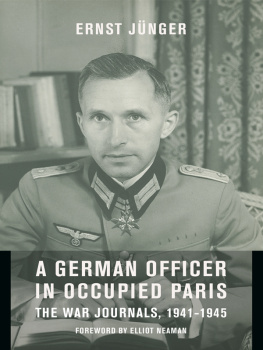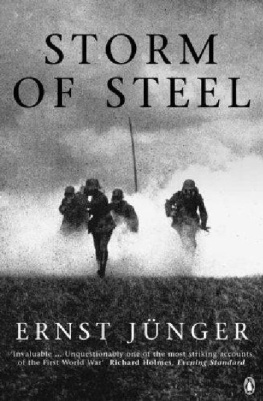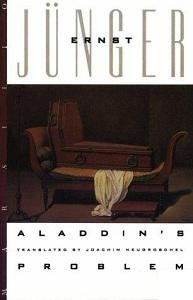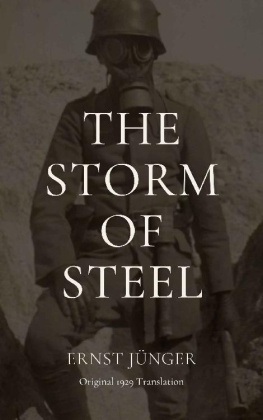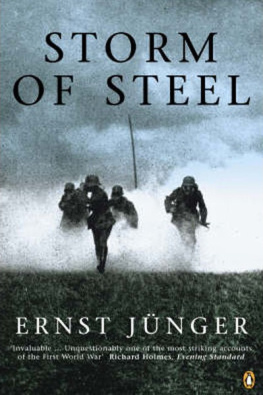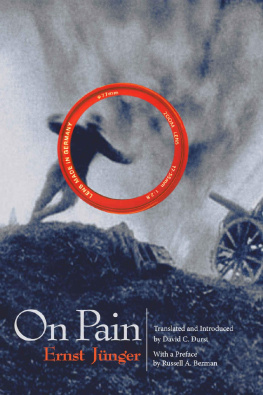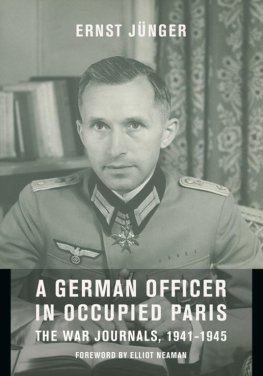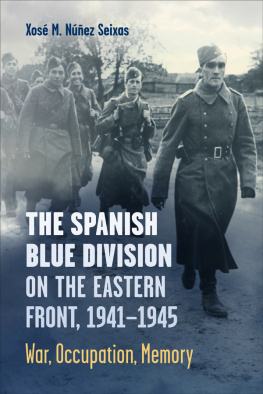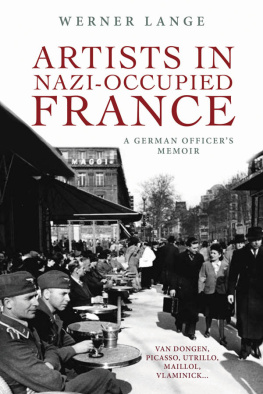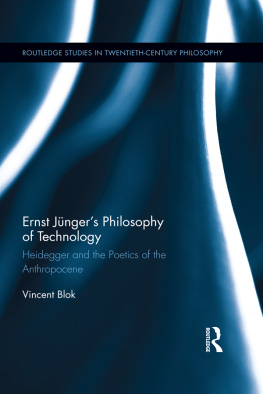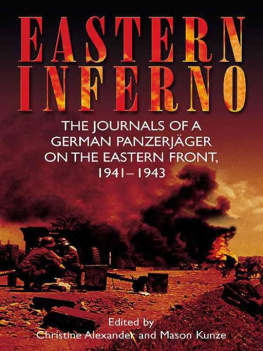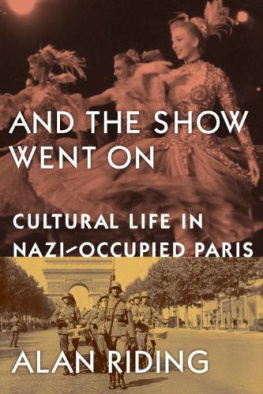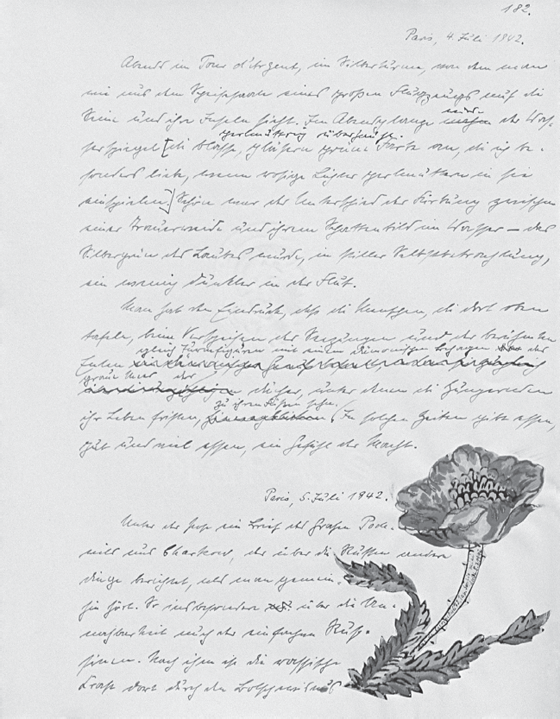Table of Contents
A GERMAN OFFICER IN OCCUPIED PARIS
EUROPEAN PERSPECTIVES
A SERIES IN SOCIAL THOUGHT AND CULTURAL CRITICISM
Facsimile page from the First Paris Journal (45 July 1942)
EUROPEAN PERSPECTIVES
A SERIES IN SOCIAL THOUGHT AND CULTURAL CRITICISM
LAWRENCE D. KRITZMAN, EDITOR
European Perspectives presents outstanding books by leading European thinkers. With both classic and contemporary works, the series aims to shape the major intellectual controversies of our day and to facilitate the tasks of historical understanding.
For a complete list of books in the series, see the Columbia University Press website. https://cup.columbia.edu/series/european-perspectives-a-series-in-social-thought-and-cultural-criticism
ERNST JNGER
A GERMAN OFFICER IN OCCUPIED PARIS
THE WAR JOURNALS, 19411945
INCLUDING NOTES FROM THE CAUCASUS AND KIRCHHORST DIARIES
FOREWORD BY ELLIOT Y. NEAMAN
TRANSLATED BY THOMAS S. HANSEN AND ABBY J. HANSEN
COLUMBIA UNIVERSITY PRESS
NEW YORK
Columbia University Press wishes to express its appreciation for assistance given by the Pushkin Fund in the publication of this book.
Columbia University Press
Publishers Since 1893
New York Chichester, West Sussex
cup.columbia.edu
Strahlungen:
Das erste Pariser Tagebuch, Kaukasische Aufzeichnungen,
Das zweite Pariser Tagebuch, Kirchhorster Bltter
by Ernst Jnger
First published in German by Klett-Cotta 1979
J.G. Cottasche Buchhandlung Nachfolger GmbH, Stuttgart
English translation copyright 2019
J.G. Cottasche Buchhandlung Nachfolger GmbH, Stuttgart
All rights reserved
E-ISBN 978-0-231-54838-0
Library of Congress Cataloging-in-Publication Data
Names: Junger, Ernst, 18951998, author. | Hansen, Thomas S. (Thomas Stansfield), translator. | Hansen, Abby J., 1945 translator. | Neaman, Elliot Yale, 1957 writer of foreword.
Title: A German officer in occupied Paris / Ernst Junger; translated by Thomas Hansen and Abby J. Hansen; foreword by Elliot Y. Neaman.
Other titles: Strahlungen. English
Description: New York: Columbia University Press, [2018] | Translation of: Strahlungen. | Includes bibliographical references.
Identifiers: LCCN 2018020094 (print) | LCCN 2018042867 (e-book) | ISBN 9780231548380 (e-book) | ISBN 9780231127400 | ISBN 9780231127400(hardback; alk. paper) | ISBN 9780231548380 (e-book)
Subjects: LCSH: Junger, Ernst, 18951998Diaries. | Authors, German20th centuryDiaries. | Junger, Ernst, 18951998Homes and hauntsFranceParis. | Paris (France)History19401944. | Paris (France)Intellectual life20th century. | GermanyHistory19451955. | LCGFT: Diaries.
Classification: LCC PT2619.U43 (e-book) | LCC PT2619.U43 S813 2018 (print) | DDC 838/.91207dc23
LC record available at https://lccn.loc.gov/2018020094
A Columbia University Press E-book.
CUP would be pleased to hear about your reading experience with this e-book at .
Cover image: Photograph of Ernst Jnger by Florence Henri (1942).
Courtesy of the private archives of Ernst Jnger.
Cover design: Chang Jae Lee
CONTENTS
ELIOT NEAMAN
Memories bear traits of an inverse causality. The world, as an effect, resembles a tree with a thousand branches, but as memory it leads downwards into the tangled network of the roots. When I confront memories, it often seems like gathering a bundle of seaweed from the oceanthe tiny bit visible from afar, when slowly dragged up into the light, reveals an extensive system of filaments.
Ernst Jnger, A German Officer in Occupied Paris, 5 July 1942
Take yourself back in time to the summer of 1942, in Nazi-occupied Paris. A middle-age German officer in a gray uniform strolls down the Avenue Wagram, an army eagle insignia perched above his right breast pocket. The man is of medium height, of compact build, with chiseled thin features and graying hair around the temples. He turns to follow the Right Bank and inspect the bouquinistes, whose antiquarian books, cards, journals, and prints overflow from small well-worn shacks. Walking north, past the Arc de Triomphe, he stops at a stationery store on the Avenue Wagram and is jolted by the expression on the face of the girl behind the counter. Later he will write in his journal,
He leaves the shop in deep thought. The walk ends at the nearby Htel Majestic, the headquarters of the German High Command in Paris. Captain Jnger takes a seat at a table overflowing with mail written by German soldiers to friends and loved ones at home. He reads each piece carefully, marking out lines of sensitive information before placing the envelope in one pile or another bound for the home front. As a military censor, he is tasked with reading French newspapers and other publications for signs of insubordination. A not uninteresting assignment for a writer whose job it is to enter the minds of others.
Who was this man?
He was born in 1895 under the Wilhelmine empire, marched off to war in 1914, and ended service as a highly decorated hero. He worked as a writer in Berlin at the height of Weimar Germanys cultural rebirth, beginning in 1927, and stayed in the capital just long enough to see Hitler seize power. He fought as a captain in World War II, spending much of his time in occupied Paris close to a resistance circle of aristocratic Prussian generals. He lived out much of the rest of his life in a small Swabian village through the period of the cold war and after the downfall of communism. He lived long enough to see Germany reunified and died in 1998, a celebrated centenarian and Olympian figure.
Jnger was the oldest of six children, two of whom did not survive infancy. From his father Ernst Georg, a chemist, he inherited the sharp analytical skills of a scientist, and from his mother Karoline Lampl, he received artistic capacities and an eye for natural beauty.
In 1913 Jnger realized his first youthful desire for actual adventure. He crossed the French border, fibbed about his age, and joined the Foreign Legion. He was shipped off to Algeria but had no desire to become a legionnaire. Escaping from the camp in Oran, he darted off to discover Africa on his own. Quickly captured by Foreign Legion soldiers, he was held until his father arranged for his release through the German Foreign Office. The furtively proud father instructed the boy to have a photograph taken before departing. The adventure, as we will see, will come to play a central role in his life experiences, then distilled into ice-clear form in his writings.
Jngers father promised the precocious young man an adventure excursion to Kilimanjaro, the highest mountain in Africa, as long he finished school. Then came the war fever of August 1914. Jnger rushed to Hanover and volunteered for the Seventy-Third Regiment of General Field Marshal Prince Albrecht von Preussen. After hurrying through an alternative high school degree, he shipped out at years end and was in battle by early January 1915 on the western front. Promoted the following autumn to lieutenant, in the latter stages of the war he was part of a new group of assault troops, sent in small numbers to infiltrate enemy trenches. This innovative shock strategy was more effective than mass lines of infantry, which were chewed up by the enemys machine guns, but required more skill and individual initiative. After suffering fourteen battle wounds, Jnger received the Pour le Mrite on 22 September 1918, the highest honor awarded by the Prussian military, rarely given either to soldiers of the infantry or to warriors of his tender age.

